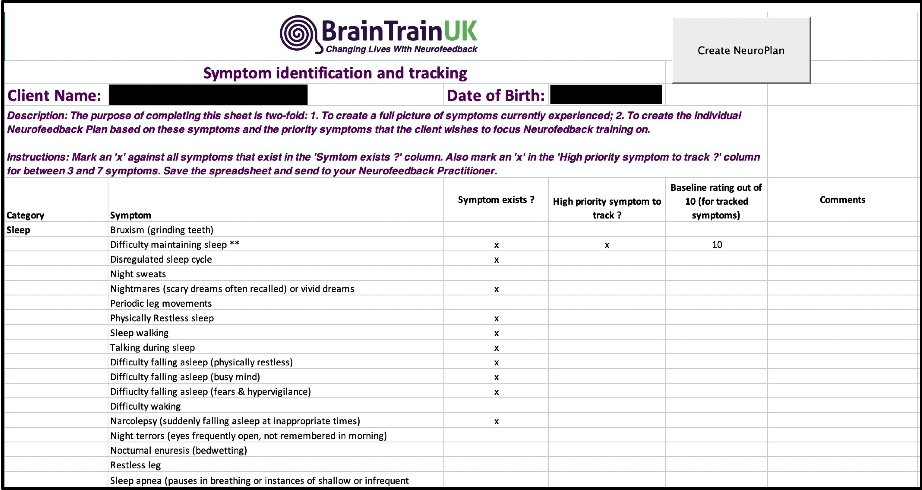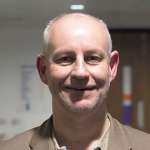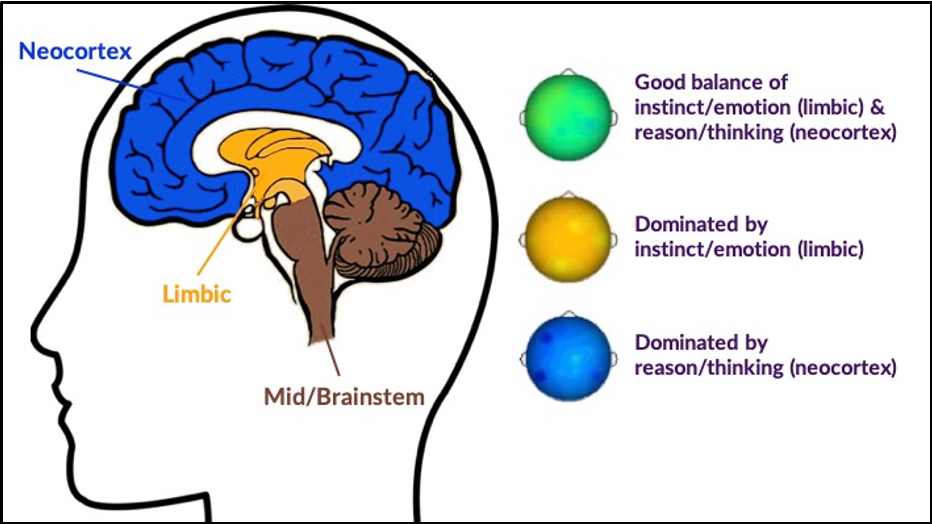Our Breakthrough Programme for Trauma
BrainTrainUK Background & Team
Applied Neuroscience Solutions Ltd, trading as BrainTrainUK since 2013, are the only multi-disciplinary, multi-modality neurofeedback therapy practice in the UK. We lead the UK in terms of size, geographic spread and thought leadership.
We have successfully delivered programmes of neurofeedback therapy to 100s of clients, both adults and children. We have treated many clients with a history of childhood trauma.
Surrey County Council’s Virtual School contracted us to provide our services to Looked After Children, and we are in discussions with several other Local Authorities and the Adoption Support Fund to make our services more widely available.
Our team of staff and advisors include:
 Zuzana Radacovska MA – Neurofeedback Practitioner
Zuzana Radacovska MA – Neurofeedback Practitioner
Degree in psychology, worked in juvenile justice system, BrainTrainUK practitioner for 5 years. Experience using bio and neurofeedback techniques for peak performance with athletes and executives.
 Dr Marina Chirco MD – Medical Advisor
Dr Marina Chirco MD – Medical Advisor
GMC-registered NHS Medical Doctor, post-doctorate studies in Neurofeedback, Psychoneuroendocrinimmunology, Acupuncture, NAET.
 Agnieszka Sosnecka MSc (Cog Neuro) – Neurofeedback Practitioner & Consultant
Agnieszka Sosnecka MSc (Cog Neuro) – Neurofeedback Practitioner & Consultant
Cognitive Neuroscientist specialised in Clinical Psychology & Psychopathology, PhD student creativity in autism.
 Jo-Anne Buttle MSc – Neurofeedback Practitioner
Jo-Anne Buttle MSc – Neurofeedback Practitioner
Educational Psychologist, MSc Educational Psychology, HCPC Registered. Extensive experience working with local authorities and private practice.
 Anna Dybul MSc – Neurofeedback Practitioner
Anna Dybul MSc – Neurofeedback Practitioner
Anna has a particular interest in the use of music as a therapeutic intervention for speech disorders, and the application of Neurofeedback to peak performance.
 Kirsten Antoncich MSc – Neurofeedback Practitioner
Kirsten Antoncich MSc – Neurofeedback Practitioner
Masters in Integrative Psychotherapy, has taught English & Psychology in SEN, run a mental health service in the North East of England, and pastoral support service to schools.
 Helen Wagstaff – Recruitment Consultant
Helen Wagstaff – Recruitment Consultant
Freelance recruitment professional, experience with wide range of industries and blue-chip organisations, specialist in innovative & unusual roles.
Stuart Black BSc (Eng) MSc CEng MIET – Founder & Managing Director
Chartered Engineer, 30 years experience with blue chip organisations. Complex international product development, board-level change and interim management. 4 years as Executive Director at Cromwell Hospital in London. Board-level advisor to NHS Trusts.
Special Guardian to 3 children of a friend who died in 2017. Family Rights Group Kinship Panel Member & Trustee. Chair of North West Surrey Foster Care Association. Special interest in the application of EEG neuroscience to transform outcomes following Adverse Childhood Experiences.
Sairah Shah BA MA PGCE – Senior Education Consultant
Graduated in History in History (Asia and Africa) from the University of London’s School of Oriental & African Studies where she also gained a Masters in History.
Sairah has taught History and been a successful education leader in a variety of mainstream contexts in including 5 secondary schools, an FE College and local authority for 20 years.
 Dr David A Kaiser PhD – Scientific Advisor
Dr David A Kaiser PhD – Scientific Advisor
Doctor in Psychology and Neuroscience. Developer of SKIL software for use in neurotherapy and brain function assessment which relies on functional connectivity and hemodynamics.
Editor of the Journal of Neurotherapy for a decade, fellow of the International Society for Neurofeedback and Research, President of the Neurofeedback Division of the Association for Applied Psychophysiology and Biofeedback, has taught neuropsychology and neuroscience courses at various colleges. Widely published.
 Marcia Saul BSc MSc – Postgraduate Researcher, Bournemouth University
Marcia Saul BSc MSc – Postgraduate Researcher, Bournemouth University
BSc in Biology with Psychology, MSc in Computational Neuroscience. Marcia is conducting doctorate research defined and sponsored by BrainTrainUK into the use of neurofeedback with multiple participants (aka hyperscanning) to address social anxiety.
 Dr Fred Charles BSc MSc PhD – Deputy Head of Department in Creative Technology, Bournemouth University
Dr Fred Charles BSc MSc PhD – Deputy Head of Department in Creative Technology, Bournemouth University
BSc in Computer Science, Master’s degree in Computer Aided Graphical Technology Applications, PhD Computer Science.
Fred is one of Marcia’s supervisors, and co-authored published research40 on a randomised, placebo-controlled trial using neurofeedback to down-regulate limbic activity to reduce pain symptoms in fibromyalgia sufferers.
 Dr Xun He BSc PhD – Senior Lecturer in Psychology, Bournemouth University
Dr Xun He BSc PhD – Senior Lecturer in Psychology, Bournemouth University
BSc in Biology, PhD in Biophysics. Xun is Marcia’s other supervisor. An experimental psychologist and social neuroscientist, studying the behaviour and neural underpinnings of social attention and social perception.
Xun’s main research question is how human attention and perception performance is shaped by social interactions such as joint action and shared attention, and whether social behaviour can be improved by neurofeedback? Expert in the electroencephalography (EEG) technique (including hyperscanning EEG) and Head of the Bournemouth EEG Lab.
Our Programme
Selection
Clients whose medication is stable and are able to commit to attending 2x 45 minutes appointments a week. There must also be a commitment from clients/parents/carers to engage in the intake assessment and planning process (described below), and to provide feedback on an ongoing basis throughout the programme.
There is no minimum or maximum age.
Consent, Confidentiality, Safeguarding
Initially we brief the clients on the concept, with their parents/carers present in the case of young people. If a group of young people are to take part in the programme, then this can be done as a group.
At this briefing confidentiality is discussed, and it is agreed that any brain mapping information will be anonymised.
This is particularly relevant for Looked-After Children. The only document that links the client’s details to their letter is a password-protected Excel file, stored on a password protected laptop with encrypted hard-drive, backed up with 2-Factor authentication.
All BrainTrainUK practitioners have Disclosure and Barring Service Enhanced Checks.
Assessment
Following the briefing, each client attends our clinic individually, where the process is explained again.
Intake paperwork is distributed to clients/parents/carers/key workers, which consists of:
- Contact details.
- An 8-page History Assessment, including sections on Personal History, Treatment History, General Development, Family History and Adverse Childhood Experience (ACE) questionnaire.
- Symptom profile capture, consisting of >150 symptoms to be reviewed, selected if the young person suffered them, and to identify 3-7 symptoms to be tracked, with a baseline rating of severity from 1 (least severe) to 10 (most severe).
A Cognitive Assessment is available for adults and children aged 6 or over. This consists of activity-based tests that are done on-line from a computer or tablet. We use tests and normative databases provided by Cambridge Brain Sciences.
Brain Mapping
QEEG data is captured, using a suitably-sized Electro-Cap:
3 x 3-minute samples are captured, both eyes open and eyes closed, i.e. a total of 9 x 3-minute samples.
The Advanced QEEG Brain Mapping (AQBM) reports are prepared as illustrated by the diagram below:
 AQBM reports are preferably debriefed face-to-face with clients. With young people this is normally done together with their parents/carers, depending on their level of understanding, and hard copies are provided.
AQBM reports are preferably debriefed face-to-face with clients. With young people this is normally done together with their parents/carers, depending on their level of understanding, and hard copies are provided.
A key parameter measured by the AQBM is ‘corticolimbic integration’, which is the degree to which brain regulation is balanced between instinct (limbic brain) and reason (neo-cortex).
BrainTrainUK AQBM Corticolimbic Integration Model

 To communicate this concept with young people, a copy of Professor Steve Peters’ 2018 book, “My Hidden Chimp”41 is used.
To communicate this concept with young people, a copy of Professor Steve Peters’ 2018 book, “My Hidden Chimp”41 is used.
Peters uses exactly the same scientific concept with different language. Peters calls the limbic brain the red ‘chimp brain’ and the neo-cortex the blue ‘our brain’.
We talk each client through the concept and all young people receive a copy of the book. A companion book for adults, “The Silent Guides”42 is made available to adults on request.
We find that the neuromarkers found in the reports resonate with client’s histories and traits, for example issues with authority, being easily led (‘recruited’ in the language of the report), and anxiety.
The debriefing has several key messages and objectives:
- Educating them the tension between their ‘own’ brain and their ‘chimp’ brain is natural and normal.
- Showing them evidence that the challenges that they have are reflected in their brain patterns as areas where there is an imbalance between their ‘own’ brain and the ‘chimp’ brain.
- Educating them that their brains are not abnormal, that their brains have adapted to working a particular way because of some of the things they have experienced, to protect them, and this is quite normal.
- Validating with them if this adaptation means that their brain sometimes responds in unhelpful ways, and can sometimes get them into trouble?
- Educating them that just as their brains have adapted so far, they can adapt again.
- Motivating them by explaining that their past explained how they were now, but didn’t have to define their future.
- Explaining that we also have a tool, neurofeedback, to help their brain to learn how to adapt to a new, more helpful way of working.
The ability to back the theory up with real, individualised data has much more power than other ‘neuro-education’ activities such as using the brain ‘hand model’.
In addition, the ability to obtain insights into client’s world-views and response habits, perhaps that they themselves don’t understand or appreciate, can be valuable to parents, carers, teachers, social workers and therapists (with appropriate consent).
Neurofeedback Therapy
Individual Neurofeedback training plans are created by mapping the symptoms identified to brain functions, and then to neurofeedback protocols: Example Symptomology profile capture and baseline, showing 18 of 150 symptoms
Example Symptomology profile capture and baseline, showing 18 of 150 symptoms
Priority symptoms (identified in the plan above with **) are rated 1-10 for severity to establish a baseline.
Neurofeedback Plans can be likened to route maps. They establish a potential route and a starting point, but the actual route taken will be adjusted according to what is encountered on the journey. In the case of neurofeedback feedback on the client’s response is critical to guiding this route.
Neurofeedback therapy sessions are planned to be delivered from one of our existing clinics.
For Local Authority contracts, we can also set up a clinic in a more local setting, at a rate of 2 sessions per week per looked after child/young person.
Measures
Measures are primarily symptom ratings together with verbal reports of progress from clients/parents/carers. The symptoms selected for tracking are entered into an online symptom-tracking system and baselined. An email is automatically sent to clients/parents/carers twice a week with a link to click on, re-rate the symptoms and make any comments.
![]() Example Symptom Tracking System graphical output
Example Symptom Tracking System graphical output
→Continue reading about the business case for neurofeedback for trauma
→Read about how existing therapists can partner with BrainTrainUK to offer neurofeedback for truama
References
40Goldway, N., Ablin, J., Lubin, O., Zamir, Y., Keynan, J.N., Or-Borichev, A., Cavazza, M., Charles, F., Intrator, N., Brill, S. and Ben-Simon, E. (2018). Volitional limbic neuromodulation has a multifaceted clinical benefit in Fibromyalgia patients. Neuroimage, 186, pp.758-770.
41Peters, Steve. My Hidden Chimp. Templar Publishing, 2018
42Peters, Steve. The Silent Guides: The new book from the author of The Chimp Paradox. Bonnier Publishing Ltd., 2018.
LIKE TO KNOW MORE?
0207 118 0887
If you would like to learn more about the benefits of neurofeedback for treating trauma please call BrainTrain UK. We offer a free initial telephone consultation, will answer any questions you have and explain the treatment to you. There is no obligation to get treatment after the consultation if you decide it isn’t for you.



